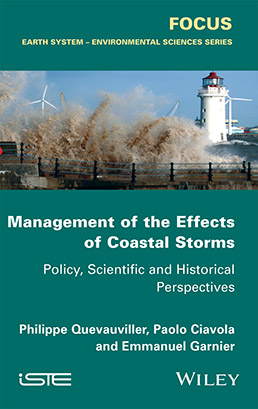
A large part of the world’s coastlines consists of sandy beaches and dunes that may undergo dramatic changes during storms. Extreme storm events in some cases dominate the erosion history of the coastline and may have dramatic impacts on densely populated coastal areas. Policy, research and historical background are essential elements that need to be interconnected for effective coastal planning and management.
This book discusses this framework, with Chapter 1 providing an insight into policy settings and science-policy interactions in the area of coastal risks related to storms and flooding, and integrated coastal zone management. This is followed by a review of the current understanding of the processes generating extreme coastal events, the morphological evolution of coastlines during and after the events, and the methods for monitoring the process as it occurs or for post-event appraisal. The final chapter discusses the importance of historical approaches regarding coastal threats, taking the Xynthia storm as an example.
1. Coastal Storms and Flooding: Regulatory Framework and Science–Policy Interactions.
2. Techniques for the Assessment of Coastal Storm Risk.
3. Xynthia, February 2010: Autopsy of a Foreseable Catastrophe.
Philippe Quevauviller is Associate Professor at the Vrije Universiteit Brussel, Belgium. He holds two PhDs (Oceanography and Chemistry) from the University of Bordeaux (France) and is involved in teaching on integrated water resources management and disaster risk reduction research programming.
Paolo Ciavola is Associate Professor of Geomorphology at the University of Ferrara, Italy. He holds an MSc in Geology from the University of Bologna (Italy) and a PhD in Marine Sciences from the University of Algarve (Portugal). He is currently working on coastal processes and risk from extreme storms.
Emmanuel Garnier is Research Director of the CNRS in France. He holds a PhD in Environmental History from the University of Besançon (France) and is currently working on natural risks and more particularly on past extreme events.